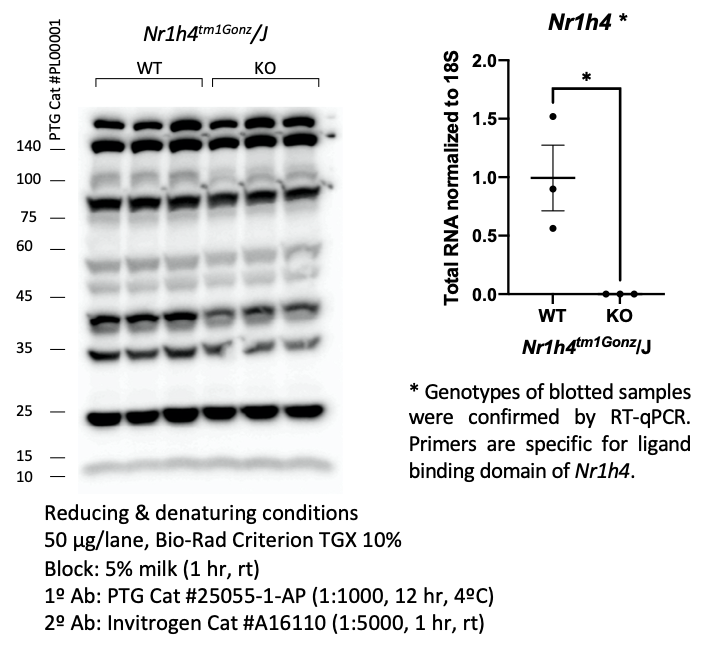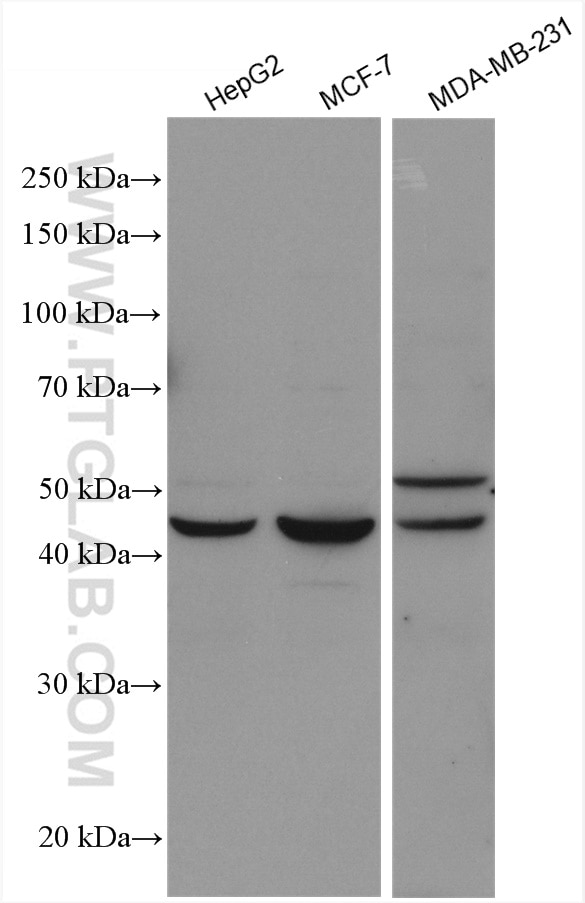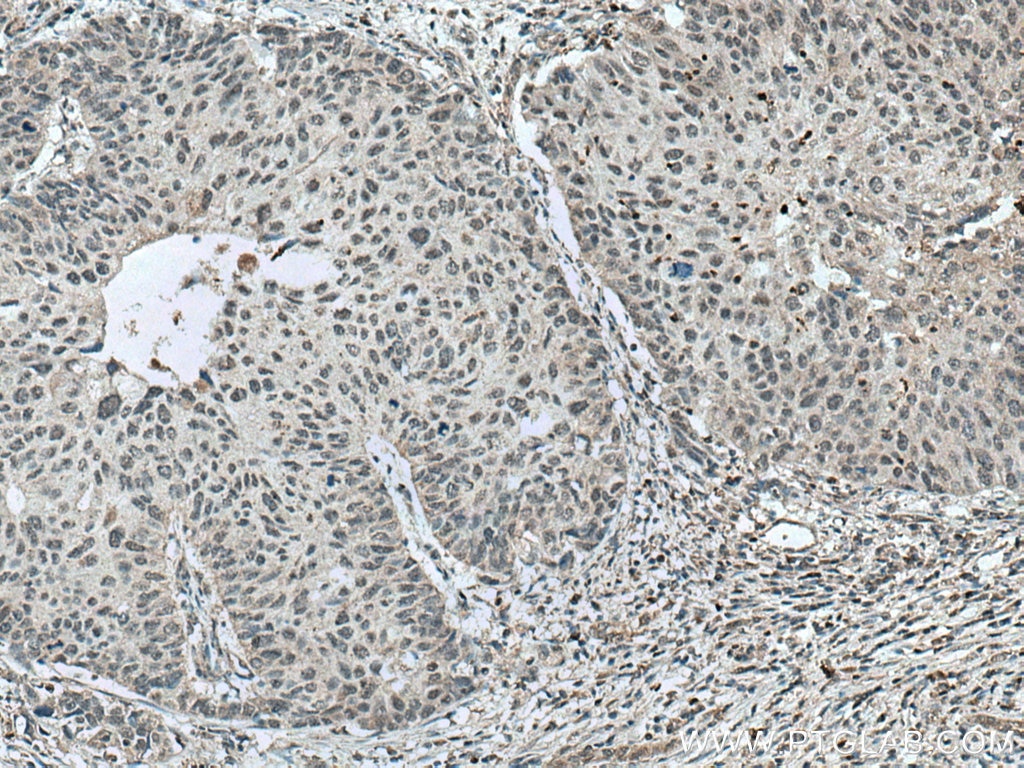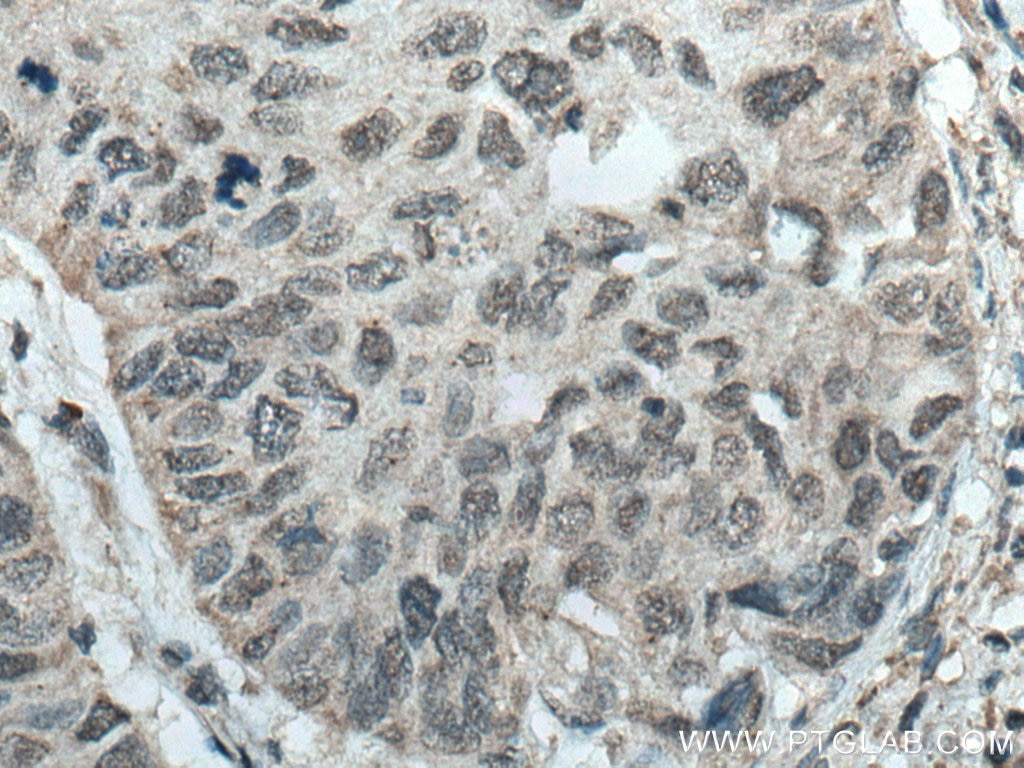- Featured Product
- KD/KO Validated
NR1H4 Polyklonaler Antikörper
NR1H4 Polyklonal Antikörper für IHC, WB, ELISA
Wirt / Isotyp
Kaninchen / IgG
Getestete Reaktivität
human und mehr (3)
Anwendung
WB, IHC, IF, ELISA
Konjugation
Unkonjugiert
Kat-Nr. : 25055-1-AP
Synonyme
Galerie der Validierungsdaten
Geprüfte Anwendungen
| Erfolgreiche Detektion in WB | HepG2-Zellen, MCF-7-Zellen, MDA-MB-231-Zellen |
| Erfolgreiche Detektion in IHC | humanes Nierengewebe Hinweis: Antigendemaskierung mit TE-Puffer pH 9,0 empfohlen. (*) Wahlweise kann die Antigendemaskierung auch mit Citratpuffer pH 6,0 erfolgen. |
Empfohlene Verdünnung
| Anwendung | Verdünnung |
|---|---|
| Western Blot (WB) | WB : 1:1000-1:6000 |
| Immunhistochemie (IHC) | IHC : 1:50-1:500 |
| It is recommended that this reagent should be titrated in each testing system to obtain optimal results. | |
| Sample-dependent, check data in validation data gallery | |
Veröffentlichte Anwendungen
| KD/KO | See 2 publications below |
| WB | See 34 publications below |
| IHC | See 4 publications below |
| IF | See 10 publications below |
Produktinformation
25055-1-AP bindet in WB, IHC, IF, ELISA NR1H4 und zeigt Reaktivität mit human
| Getestete Reaktivität | human |
| In Publikationen genannte Reaktivität | human, Hausschwein, Maus, Ratte |
| Wirt / Isotyp | Kaninchen / IgG |
| Klonalität | Polyklonal |
| Typ | Antikörper |
| Immunogen | NR1H4 fusion protein Ag21878 |
| Vollständiger Name | nuclear receptor subfamily 1, group H, member 4 |
| Berechnetes Molekulargewicht | 486 aa, 56 kDa |
| Beobachtetes Molekulargewicht | 48 kDa |
| GenBank-Zugangsnummer | BC130573 |
| Gene symbol | NR1H4 |
| Gene ID (NCBI) | 9971 |
| Konjugation | Unkonjugiert |
| Form | Liquid |
| Reinigungsmethode | Antigen-Affinitätsreinigung |
| Lagerungspuffer | PBS mit 0.02% Natriumazid und 50% Glycerin pH 7.3. |
| Lagerungsbedingungen | Bei -20°C lagern. Nach dem Versand ein Jahr lang stabil Aliquotieren ist bei -20oC Lagerung nicht notwendig. 20ul Größen enthalten 0,1% BSA. |
Hintergrundinformationen
Nuclear Receptor subfamily 1, group H, member 4 (NR1H4, also known as FXR) is a receptor for bile acids and has an important role in regulating energy metabolism in liver, muscle and adipose tissues in humans and animals. NR1H4 is highly expressed in liver and has a role in lipid metabolism, whereas none of the other protein-coding genes in the region has known biological links with cholesterol, further supporting a role for NR1H4 in regulation of cholesterol levels. NR1H4 have four isoforms, i.e., FXRalpha1, FXRalpha2, FXRbeta1, and FXRbeta2, and each isoform has a different expressional level and transcriptional activity depending on its location within specific tissues. (PMID: 14733360, PMID: 30787420)
Protokolle
| Produktspezifische Protokolle | |
|---|---|
| WB protocol for NR1H4 antibody 25055-1-AP | Protokoll herunterladen |
| IHC protocol for NR1H4 antibody 25055-1-AP | Protokoll herunterladen |
| Standard-Protokolle | |
|---|---|
| Klicken Sie hier, um unsere Standardprotokolle anzuzeigen |
Publikationen
| Species | Application | Title |
|---|---|---|
Sci Total Environ Bisphenol A induced hepatic steatosis by disturbing bile acid metabolism and FXR/TGR5 signaling pathways via remodeling the gut microbiota in CD-1 mice | ||
Phytomedicine Jiang-Tang-San-Huang pill alleviates type 2 diabetes mellitus through modulating the gut microbiota and bile acids metabolism | ||
Biomater Sci Mesenchymal stem cell-derived exosome mitigates colitis via the modulation of the gut metagenomics-metabolomics-farnesoid X receptor axis | ||
Front Pharmacol Bacteroides dorei BDX-01 alleviates DSS-induced experimental colitis in mice by regulating intestinal bile salt hydrolase activity and the FXR-NLRP3 signaling pathway | ||
PLoS Negl Trop Dis FXR deficiency in hepatocytes disrupts the bile acid homeostasis and inhibits autophagy to promote liver injury in Schistosoma japonicum-infected mice. | ||
Food Chem Toxicol Gut microbiota mediates methamphetamine-induced hepatic inflammation via the impairment of bile acid homeostasis. |
Rezensionen
The reviews below have been submitted by verified Proteintech customers who received an incentive forproviding their feedback.
FH Bryce (Verified Customer) (04-16-2021) | Antibody did not work for mouse kidney homogenates. There was no observable difference between kidneys from wild type and knockout mice. Genotypes of blotted samples were confirmed by RT-qPCR.
 |




